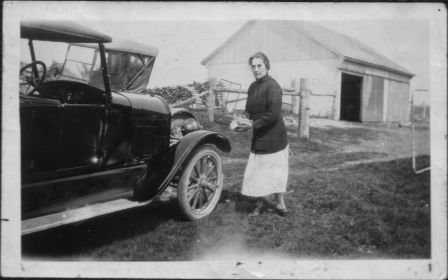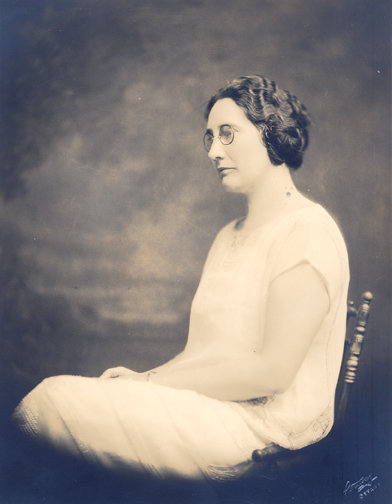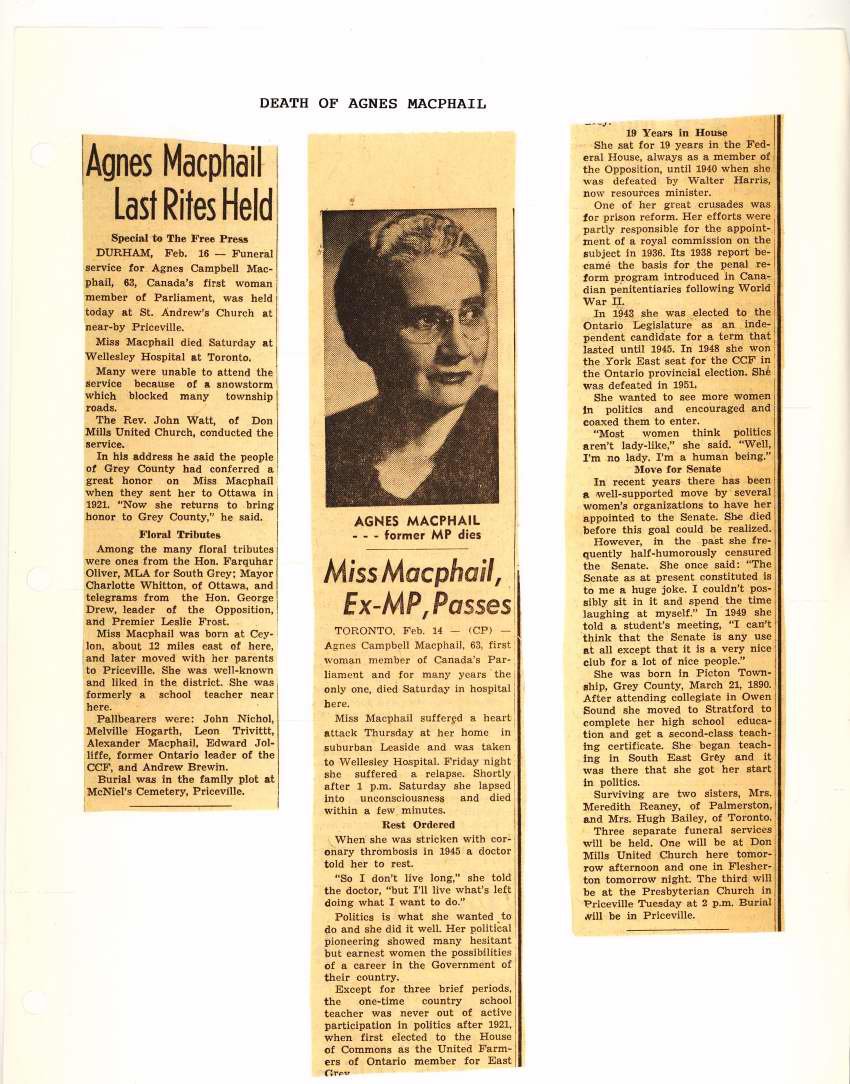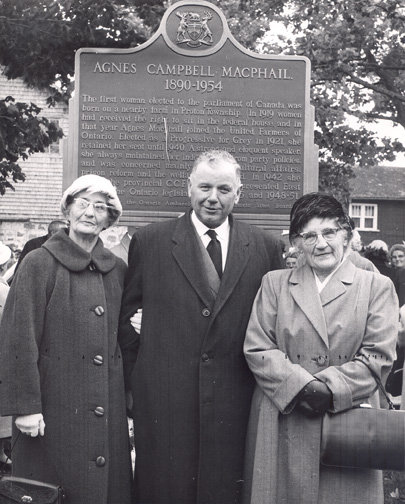Agnes Macphail (1890-1954) was the first woman elected to Canadian Parliament. During her lifetime, she was a dutiful daughter and sister, a willful teenager, dedicated schoolteacher, and champion for equal rights and fair treatment for everyone.
On March 24, 1890, Agnes Macphail was born to the McPhails and Campbells, Scottish descendants who lived close together in Proton Township, one of the wettest areas in South Grey County.
Dugald prospered by farming the land, cattle dealing and auctioneering. He didn't believe that women should do heavy work, but Agnes did not take to housework with any enthusiasm and helped Dugald tend and harness the animals instead. Along with regular family gatherings, the McPhail home was a social gathering spot where groups of men talked over farm politics and affairs of the day while the women discussed domestic issues and events. Already rebelling against the narrow trap of marriage, Agnes' resolve was fueled in these early years to make a contribution to society, "in addition, or in place of, having children...[and] doing some work as a person".
Macphail's love for her rural community and her strong ideals about their needs in Canadian legislation led her to a career in politics, activism, and journalism.
Macphail trained and worked as a teacher for several years before pursuing political life. She became interested in local organizing and joined the United Farmers Of Ontario and its women's group, the United Farm Women Of Ontario.
She also began writing articles about her memories and family. You can view and read the transcripts of several - Part I, Part II, and Part III - thanks to the Grey Highlands Public Library.
The rugged honesty, the devotion to duty and the real Christianity of these early settlers make us look very small. We do not realize how great is the debt of gratitude we owe them. It is a duty as well as a privilege to preserve the stories of the pioneer days in Ontario that the children of today and tomorrow will realize what a struggle it was to clear land and make it fir for cultivation, and that they may be proud to be descendants of the clearers of the forest and the tillers of the soil....
I hope that these two stories of pioneer women, though so imperfectly told, will help us all to revere the memory of those who have gone on, and to tenderly love and care for those who yet remain, and to consider it a blessed privilege to have heard the stories of early life in Ontario with all its toil, its simple joys; its pathos and bravery from their own lips.
Such people, your grandparents and mine, are the real builders of this country. They were and are true patriots. They built the foundation of the country and true, and if we sit around and let “captains of industry” so undermine it, that this land for which they have toiled so hard is taken out of our hands by fiscal policy of this Dominion, we are not worthy of our heritage.
- Agnes Macphail
Through Agnes's membership in the United Farmers of Ontario, she was asked to run against 24 other opponents for the Parliamentary seat in Grey County in the 1921 election. She was elected to the House of Commons as a member of the Progressive party. She was re-elected in 1925, 1926, and 1930. Her politics tended to run too progressive, though, and she began to identify as a socialist.
She joined a small group of like-minded Progressives and they soon formed their own party, the Co-operative Commonwealth Foundation. Agnes was the first president of the Ontario CCF in 1932, but left in 1934 when the United Farmers Of Ontario dropped their allegiance.
Macphail again ran as an MP in 1935, identifying as a United Farmers Of Ontario-Labour candidate even though the group wasn't officially a political party anymore. She held that seat until 1940.
In 1943, Macphail ran in the provincial election and joined the Legislative Assembly of Ontario as a member of the CCF once again. She lost that seat in 1945, then gained it again in 1948. During this term, she passed Ontario's first legislation guaranteeing equal pay for women and men in the workforce.
Macphail died in 1954, at the age of 63. Macphail's portrait was pictured on the Canada 150 commemmorative $10 bill.
Macphail cared strongly about many issues: prison reform, women's rights, pensions, abolition of the death penalty, workers' rights, pacifism, support for disabled citizens, low-cost housing, and the issues affecting her rural constituents. She was educated and opinionated on everything from human rights to international trade, and was brilliant at galvanizing her support base in Ontario to win elections, write letters, and speak up about their opinions.
One of Macphail's strongest political passions was prison reform. She fought to reduce solitary confinement and ensure that all inmates had space to move around, and access to natural light and fresh air. She famously visited Kingston Penitentiay and insisted that they lock her up in a tiny dark cell called "the hole," so that she could report firsthand on the conditions prisoners faced.
Agnes Macphail was wrong about some of the issues she fought for passionately. The most significant problem with Agnes's legacy is her approval of forced sterilization, a surgical procedure used on women without their approval to ensure they could not have children. In Agnes's time sterilization was commonly used on Indigenous women and women of colour in the hospital for other ailments - a violation of their consent and their human rights. Unfortunately, forced sterilization was used on a lot of populations for a very long time, especially people with disabilities. For Agnes the belief in eugenics was the cause of her support for sterilization: she thought that people of Caucasian descent were stronger, smarter, and better able to provide for their families and communities, and therefore Canada should support children from those races and limit the population growth in other ethnicities. We now know that this belief is not only scientifically wrong but deeply racist, and that Agnes Macphail was a white supremacist. A belief in eugenics has been sadly common in Canadian politicians and policymakers for many many decades, such as Agnes's fellow CCF politician Tommy Douglas, who wrote his masters thesis on the concept in 1930. The Famous Five women, who fought for the right of women to vote, were also fierce eugenicists. While eugenics never made it into federal law, it was a problem all over Canada. In 1928 Alberta created a sterilization law that lasted for almost fifty years, responsible for sterilizing over 4,000 women while it existed.
I just wonder how much longer we’re going to allow sub-normal people to produce their kind.... You farmers - would you want the worse type of your cattle to be seed-bearers?
- Agnes Macphail, as quoted in Our Own Master Race: Eugenics in Canada, 1865-1945 by Angus McLaren, 1990
Agnes also, along with many other suffragists and women's rights activists of the time, believed in things like temperance - making alcohol illegal - in order to preserve Christian values and create a society with less addiction, violence, and recklessness. Specifically, many feminists believed that abolishing alcohol would reduce domestic abuse - drunk husbands beating their wives and children. While we can respect her intent, we now tackle the problem in different ways.

Photo circa 1925 courtesy the Grey Highlands Public Library. [Learn More]
Agnes dealt with a large amount of abuse and mistreatment from her political colleagues, from newspaper columnists, and from the public at large. Critics made fun of her clothes and appearance, and downplayed her willpower and spirit in favour of mocking her for being a "weak woman." The headline of a Maclean's story in 1922 about her election was "The only M.P. who can—Bake, churn, cook, milk, sew, hitch, teach, talk—and do ‘em all well!"
Even after her win in 1921, male MPs told her she had "made her point" and should now withdraw so that a man could take over the important duties of her position.
Agnes found the House of Commons so hostile that she lost 20 pounds within the first month of her Parliamentary appointment, from avoiding sharing the lunchroom with other MPs, who were bringing guests in to gawk at her during the meal. She also to put up with constant gossip and speculation about her love life and other personal matters.
Agnes refused to sit quietly in Parliament; from the moment of her election she continued to be outspoken about issues that mattered to her. One such issue was the pay for MPs - at the time, $4000 a year, a sum she thought was far too large for a government in so much debt. She returned $1500 of it in her first year, making enemies across party lines. In future years, Agnes took the entire salary and used it for campaigns, charity, and her organizing efforts.
Peter Mansbridge, in a 2002 speech to the Empire Club of Canada, while listing off a number of accomplished women, shares this anecdote:
Agnes Macphail. A 12 year old. She would become the first female Member of Parliament. And she would do that by overcoming some determined resistance. She would be heckled without mercy, but she would keep her wits about her and win most battles. At one rally, a heckler shouted, "Don't you ever wish you were a man?" and Agnes Macphail looked at him and said, "Yes, don't you?"

Courtesy the Grey Highlands Public Library. [Learn More]






